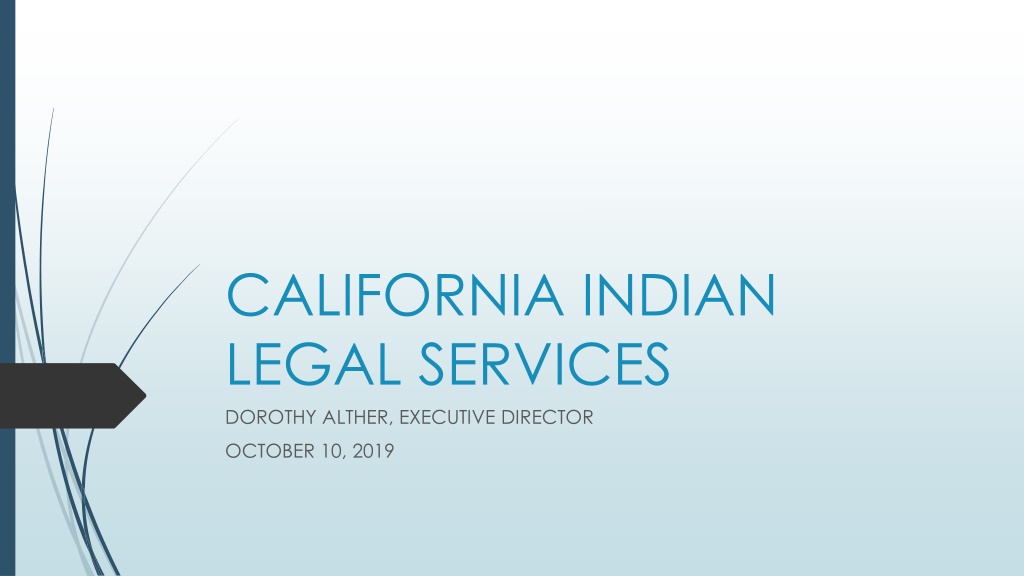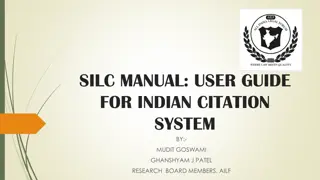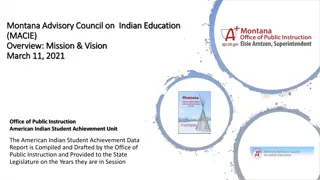California Indian Legal Services Overview
California Indian Legal Services, established in 1967, provides legal assistance to low-income Native Americans, tribes, and tribal organizations in California. With four offices located strategically across the state, they offer a range of services including tribal representation, tribal government work, and individual legal assistance on issues such as wills and land allotment. The organization's funding structure and nature of contract work reflect a commitment to serving the unique legal needs of California's Native American communities.
Download Presentation

Please find below an Image/Link to download the presentation.
The content on the website is provided AS IS for your information and personal use only. It may not be sold, licensed, or shared on other websites without obtaining consent from the author.If you encounter any issues during the download, it is possible that the publisher has removed the file from their server.
You are allowed to download the files provided on this website for personal or commercial use, subject to the condition that they are used lawfully. All files are the property of their respective owners.
The content on the website is provided AS IS for your information and personal use only. It may not be sold, licensed, or shared on other websites without obtaining consent from the author.
E N D
Presentation Transcript
CALIFORNIA INDIAN LEGAL SERVICES DOROTHY ALTHER, EXECUTIVE DIRECTOR OCTOBER 10, 2019
WHO AND WHERE WE ARE Established in 1967 as an offshoot of California Rural Legal Services (52 yrs.) Statewide program 110 federally recognized tribes and approximately 40+ unrecognized tribes 4 offices Eureka (north), Sacramento (central), Bishop (eastern) and Escondido (south) Soon to have 11 lawyers including me Serve low income Native Americans and tribes (group eligibility) and tribal organizations Fee for Service with tribes who are not low income and individuals with unique Indian law legal issues
Why Fee for Services LSC funding cut backs Tribal gaming open new area of Indian law Gaming brought lots of attorneys who were Indian law experts (not) CILS established relationships with tribes and experience with tribal governments made tribes want to stay with CILS Could not provide assistance with LSC funding Contracting was the option
LSC Regulations 45 C.F.R. 1610.2(d) Non-LSC funds means funds derived from a source other than the Corporation: 1. IOLTA (deemed public funds ) restricted 2. Private funds derived form an individual or entity other than a government source or LSC--restricted 3. Public funds non-LSC funds derived from a federal, state, or local government or instrumentality of a government (this includes IOLTA)-- restricted 4. Tribal funds funds received from an Indian tribe or [funds] from a private nonprofit foundation or organization for the benefit of Indians or Indian tribes---UNRESTRICTED
Nature of Our Contract Work Tribal representation in state dependency cases where ICWA is applicable Tribal Government work: Tribal court development Tribal Court Judge Tribal law enforcement Enrollment Ordinance Housing policy and procedures (evictions) Economic Development Oversee tribal elections Grant writing Code drafting (everything) Community Education Litigation defense and initiation Education Exclusions Assignments disputes
Nature of Our Contract Work Individuals wills and land (allotment) issues Indian Organizations: Indian Health Clinics Indian Housing Authorities Indian Water Commissions Indian Cultural Committees Indian Community College and Foundation
Unrestricted Funds Funds from contracting has allowed CILS to provide more free legal services; Do restricted work such as introduce and lobby for legislation, do prisoner rights cases, submit comments to proposed regulations and legislation, etc.; Has built a solid financial base for CILS to weather LSC and other funding cuts when they happen; Broadens attorney Indian law experience to beyond basic field work.























